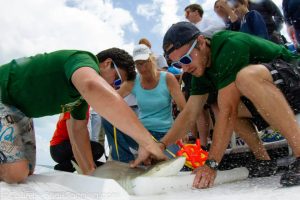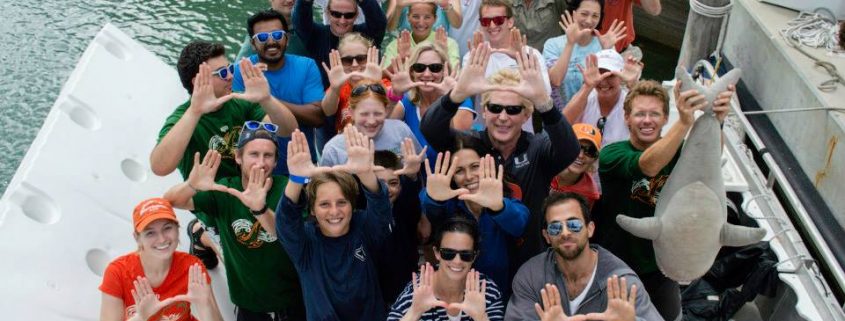Shark Tagging with Advancement
By Michelle Martinek, RJD Intern
On Thursday, March 27 we welcomed a group of beloved friends and benefactors, Advancement, aboard the ship Diver’s Paradise for a day of fun, good food, and of course shark tagging. The weather was chilly yet invigorating. As the last remnants of sleep left my eyes, we reached our nearby location for the day. Captain Eric took us to the waters of Stiltsville since the weather was causing unpleasant waves farther offshore. For anyone unfamiliar, Stiltsville is a small group of wooden houses on stilts built in the mid 1900’s on the sand banks of the Safety Valve on the edge of Biscayne Bay. Our delightful intern Sam shared the history of the area with me and some guests. I highly recommend looking into it if interested. The saying is always true: you learn something new every day! Though the semester is in full swing and RJD has already conducted countless successful boating trips, this was only my second of 2014. It felt so good to get back into the swing of things: cutting bait, attaching floats, talking about sharks with everyone. I could have never anticipated was just how helpful and eager our participants would be! It’s always amazing for us to see our passion spread to everyone we get to bring on the boat. Even though the research tasks never get old for us, it’s always a joy to see other people learn and preform them, interacting with the sharks and becoming a part of the scientific process.
Luck was on our side that day as our very first line had a handsome, male, lemon shark. It did mean I lost a bet on which line would have the first shark, but that’s the sort of thing you’re happy to be wrong about. When life hands you lemon sharks, you get to work! He measured close to seven feet in total length, all of our data samples were successfully collected, and the shark was released in good condition.
With the help of a new and improved centrifuge we ran blood work to test hematocrit levels. Hematocrit is the ratio of oxygen-transporting red blood cells to plasma in the blood. Same as it is used by doctors and vets for humans, cats, dogs, and other animals, it helps us monitor the health of the sharks. We’re very happy to have new technology on board to make this important test easier.
Unfortunately our success on the first line was not indicative of a busy day. Our next catch came a while later and was a calm, 5 foot, female Blacktip. It was quickly obvious what an amazing group we had on board. All our guests both young and old were gathered nearby for a look at any shark and were always eager for any chance to assist in our research.

A participant helps take measurements of a shark while others wait attentively, ready to do their jobs.
Every job was done quickly and efficiently and their respect for the sharks was apparent. The younger members weren’t squeamish at all about getting their hands on juicy pieces of tuna bait and they pulled in the 35 pound drumlines with no hesitation. I was delighted by the quick wit and enthusiasm of our citizen scientists. Having no younger siblings of my own, my favorite moment was when the kids began a friendly competition over hooking the floating buoys and had me help them. I may have joined RJD for the chance to do amazing shark research, but interacting with kids is one of many unexpected joys it provides.
Our last catch of the day was a 4 foot, female Blacknose. This was particularly exciting for me because it was the first time I was assigned to the head of a shark to bring it on board and hold. Even a small shark can provide an adrenaline rush the first time you get to be so close to the head. All of our samples were quickly taken and like the previous two sharks she was given a plastic spaghetti tag then released in good condition. Even though this was one of the calmest trips I’ve had, it was extremely enjoyable thanks to a great group of interns and participants. I want to thank both my more experienced interns for giving me advice as I got back into the groove of things, and of course the Advancement group for being so helpful on the boat and supporting all the research we do.







Leave a Reply
Want to join the discussion?Feel free to contribute!